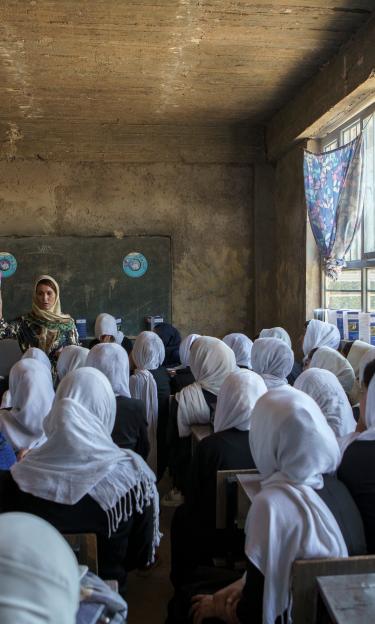No country in the world should bar women and girls from receiving an education. Education is a universal human right that must be respected. The international community has the responsibility to ensure that the rights of Afghan girls and women are restored without delay. The war against women must stop.Audrey Azoulay UNESCO Director-General
On the occasion of the International Day of Education, on 24 January, UNESCO is hosting an event at the United Nations in New York, with the contribution of the UN Secretary-General, the President of the UN General Assembly, as well as UNESCO's Director-General. The first panel discussion will be devoted to the education of girls and women in Afghanistan.
Currently, 80% (2.5 million) of school-aged Afghan girls and young women are out of school, because of the decision of the de facto authorities to deny them access to secondary schools and universities. Since August 2021, UNESCO has adapted its interventions to support the continuity of education in challenging circumstances.

A UNESCO advocacy campaign reached over 20 million Afghans to increase public awareness of the right to education for youth and adults, especially adolescent girls and women. UNESCO has also partnered with NGOs on the ground, providing content and funding to deploy a community-based literacy campaign that targeted 25,000 young people and adults in rural areas, including mostly adolescent girls above the age of 15 and women.
To reach as many girls and women as possible, UNESCO is also working to provide distance education through Afghan media outlets, especially radio stations. Radio is accessible to more than two thirds of the population and has the advantage of being available directly in homes.
Thanks to many donors, UNESCO is supporting them in the production of conflict-sensitive, humanitarian, health and educational public interest content, aiming to reach at least six million Afghans, with a specific focus on women and girls. This includes direct support to a women-led station that will produce over 200 hours of educational content per month dedicated to girls and women, broadcast to at least eight provinces across the country in 2023.
Every day without education hinders progress made since 2001
But nothing can replace the classroom, which is a place of social integration, where people learn to live together, where students and teachers take part in the pedagogic process. Therefore, UNESCO and its Member States will also continue their advocacy to put the right to education of Afghan girls and women at the top of the international agenda.
The decisions by the de facto authorities in Afghanistan threaten to wipe out the development gains made by the country over the past 20 years. From 2001 to 2021, Afghanistan saw a tenfold increase in enrolment at all education levels from around 1 million students to around 10 million, with the support of the international community, including UNESCO.
During this period, the number of girls in primary school increased from almost zero to 2.5 million. Women's participation in Afghan higher education also increased almost 20 times, from 5,000 students to over 100,000. Literacy rates for women almost doubled, from 17% of women being able to read and write in 2001 to nearly 30% for all age groups combined.
About 2023 International Day of Education
On the occasion of the 2023 International Day of Education, UNESCO will also publish a global report, the 2023 SDG4 Scorecard showing how fast countries are progressing towards their national benchmarks on Sustainable Development Goal 4 (quality education). So far, three in four countries have submitted benchmarks, to be achieved by 2030 for at least one of the key SDG4 indicators. The work on benchmarks shows an acute lack of data on education. Half of countries have no data on learning or the percentage of trained teachers in primary schools; a third have no data on completion or out-of-school rates.






